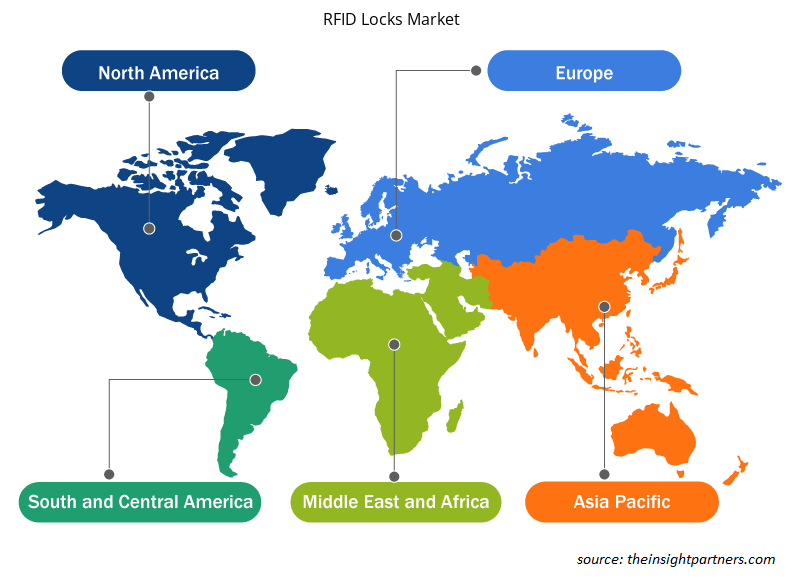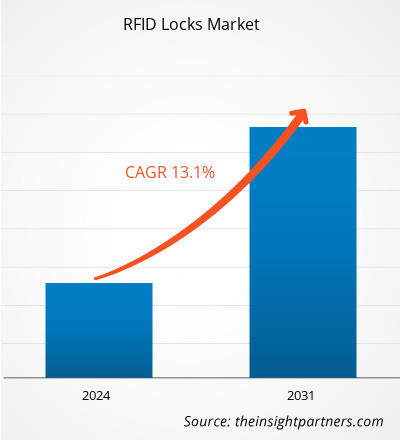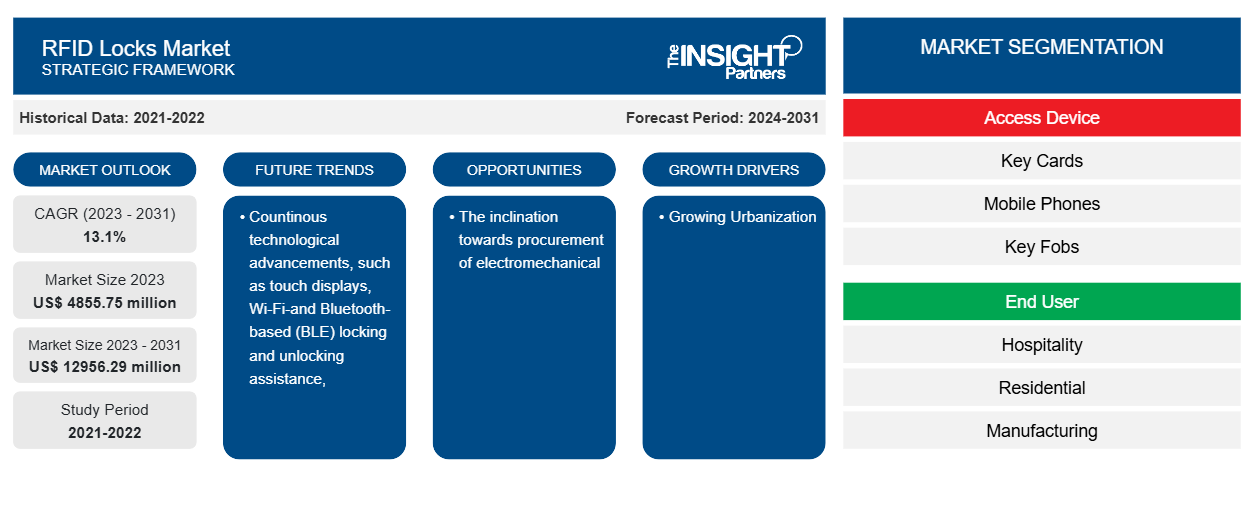من المتوقع أن يصل حجم سوق أقفال RFID إلى 12956.29 مليون دولار أمريكي بحلول عام 2031 من 4855.75 مليون دولار أمريكي في عام 2023. ومن المتوقع أن يسجل السوق معدل نمو سنوي مركب بنسبة 13.1٪ في الفترة 2023-2031. ومن المرجح أن تظل التطورات التكنولوجية المستمرة، مثل شاشات اللمس والقفل القائم على Wi-Fi وBluetooth (BLE) ومساعدة الفتح، نظامًا رئيسيًا للتعرف على اتجاهات السوق.
تحليل سوق أقفال RFID
هناك عوامل مختلفة، أبرزها توسع صناعة الفنادق والسياحة في جميع أنحاء العالم، تدفع بناء الهياكل التجارية الجديدة، بما في ذلك الفنادق. ويعود توسع أقفال REID بشكل مباشر إلى خطط بناء فنادق ذات غرف أكثر وزيادة التمويل الحكومي لدعم صناعة الضيافة، مما يشجع على توسع السوق. أحد العوامل الأساسية التي تدفع الطلب على حلول الوصول المحسنة هو التحضر. تزداد الحاجة إلى حلول البنية التحتية المعقدة والمتقدمة بشكل متزايد نتيجة للتحضر الذي يخلق المزيد من التجمعات الحضرية والمدن التي يبلغ عدد سكانها مليون نسمة أو أكثر. يساهم هذا العامل أيضًا بشكل كبير في توسع السوق.
نظرة عامة على تقنية تحديد الهوية بموجات الراديو
يُطلق على القفل الإلكتروني الذي يستخدم بطاقة تردد راديوي كمفتاح اسم قفل RFID أو قفل بطاقة الهوية. كانت البطاقة القديمة القابلة للتلامس تحتاج إلى اتصال مادي مع قارئ لفتح القفل؛ ومع استخدام تقنية RFID، يمكن لبطاقة RFID القيام بذلك بدون تلامس. تستخدم تقنية RFID الموجات الكهرومغناطيسية لنقل الإشارات كجزء من نظام التعرف الخاص بها. بالإضافة إلى ذلك، نظرًا لمفهومها التقليدي وتكلفتها العالية، لا يتم استخدام نظام قفل RFID ليحل محل الأقفال الميكانيكية للاستخدام المنزلي. علاوة على ذلك، يمكن أن يكون الأداء في الوقت الفعلي لأقفال أبواب RFID ناجحًا أو غير ناجح.
قم بتخصيص هذا التقرير ليناسب متطلباتك
ستحصل على تخصيص لأي تقرير - مجانًا - بما في ذلك أجزاء من هذا التقرير، أو تحليل على مستوى الدولة، وحزمة بيانات Excel، بالإضافة إلى الاستفادة من العروض والخصومات الرائعة للشركات الناشئة والجامعات
-
احصل على أهم اتجاهات السوق الرئيسية لهذا التقرير.ستتضمن هذه العينة المجانية تحليلاً للبيانات، بدءًا من اتجاهات السوق وحتى التقديرات والتوقعات.
محركات وفرص تقنية تحديد الهوية بموجات الراديو
التوسع الحضري المتزايد
إن النمو السكاني العالمي وزيادة الهجرة من الريف إلى الحضر تدفع باتجاه تصاعدي في التحضر. وتتمتع الدول الأقل نموًا بمعدلات أبطأ من زيادة عدد السكان الحضريين مقارنة بالدول المتقدمة للغاية. ويتطلب تنقل الأشخاص بحثًا عن وظائف ومنازل ومساحات بيع بالتجزئة جديدة الحاجة إلى أنظمة التحكم في الوصول والأمن في المباني لإبعاد الزوار غير المرغوب فيهم. ويستخدم المزيد والمزيد من المساكن والمكاتب والفنادق والمستودعات والمواقع الأخرى أنظمة القفل الذكية. بالإضافة إلى ذلك، نظرًا لعدم وجود حاجة لحمل مفتاح أو تذكر كلمة مرور، فإن تطوير أقفال لوحة اللمس الرقمية وأقفال بصمات الأصابع وبطاقات REID والأقفال الذكية الأخرى يوفر للمستهلكين المزيد من الراحة. ومن الواضح أن القطاعين السكني والتجاري يشهدان زيادة في حلول أمان الوصول.
الميل نحو شراء المنتجات الكهروميكانيكية بدلاً من أنظمة القفل التقليدية
لقد زاد تفضيل المنتجات الكهروميكانيكية على أنظمة القفل التقليدية بشكل حاد، ومن المتوقع أن يستمر هذا الاتجاه، مما يوفر لمستخدمي أنظمة القفل الذكية مجموعة متنوعة من خيارات النمو. بعض الخصائص التي يقدمها سوق أقفال REID هي التصميم المريح، والتصميم المناسب، والامتثال لقانون الأمريكيين ذوي الإعاقة، والعالمية، والمرونة، مما يزيد من شعبيتها عبر الشركات، وخاصة الفنادق. لا تزال العديد من المنازل السكنية والشقق والمدارس والمباني التجارية الصغيرة وغيرها من المواقع المماثلة لديها أبوابها الخارجية والداخلية مقفلة باستخدام أقفال المفاتيح ومقابض الأبواب التقليدية. أصبحت حلول القفل الذكية أكثر شعبية بين أصحاب الشركات وأصحاب المنازل نتيجة للتوسع الحضري المتزايد وزيادة الطلب على الأمان. ونتيجة لذلك، لجعل أقفالهم الإلكترونية أكثر ذكاءً، يقوم صانعو الأقفال بدمج التكنولوجيا الذكية فيها. وبالتالي، من المتوقع أن يقدم الميل نحو شراء المنتجات الكهروميكانيكية بدلاً من أنظمة القفل التقليدية فرصًا جديدة للاعبين في مجال تحديد الهوية بموجات الراديو خلال فترة التنبؤ.
تحليل تجزئة تقرير RFID
إن القطاعات الرئيسية التي ساهمت في استخلاص تحليل RFID هي التطبيق والمستخدمين النهائيين.
- بناءً على جهاز الوصول، يتم تقسيم تقنية تحديد الهوية بموجات الراديو إلى بطاقات مفاتيح وهواتف محمولة وسلاسل مفاتيح. احتلت شريحة بطاقات المفاتيح حصة سوقية أكبر في عام 2023
اعتمادًا على المستخدم النهائي، يتم تقسيم RFID إلى الضيافة، والسكنية، والتصنيع، والتجزئة، والسيارات، والفضاء والدفاع، والحكومة والمرافق العامة، وغيرها.
تحليل حصة RFID حسب المنطقة الجغرافية
ينقسم النطاق الجغرافي لتقرير RFID بشكل أساسي إلى خمس مناطق: أمريكا الشمالية، ومنطقة آسيا والمحيط الهادئ، وأوروبا، والشرق الأوسط وأفريقيا، وأمريكا الجنوبية/أمريكا الجنوبية والوسطى. أصبحت تقنيات الأمان المتقدمة مثل RFID وأقفال الأبواب التي تدعم NFC أكثر شهرة في منطقة آسيا والمحيط الهادئ، وخاصة لتطبيقات الأمن المنزلي. بالإضافة إلى ذلك، تستثمر الشركات الكبرى في الدول النامية مثل الصين واليابان، مما يغذي الحاجة إلى حلول ميسورة التكلفة تسهل التحكم الفعال في الوصول . ومن المتوقع أن يزداد سوق منطقة آسيا والمحيط الهادئ طوال فترة التنبؤ نتيجة لهذا الاستثمار والاستخدام المتزايد لحلول الأمان المتقدمة.
نطاق تقرير RFID
أخبار RFID والتطورات الأخيرة
يتم تقييم تقنية تحديد الهوية بموجات الراديو من خلال جمع البيانات النوعية والكمية بعد البحث الأولي والثانوي، والتي تتضمن منشورات الشركات المهمة وبيانات الجمعيات وقواعد البيانات. فيما يلي قائمة بالتطورات في سوق اضطرابات الكلام واللغة والاستراتيجيات:
- في أغسطس 2022، اعتمدت Kalahari Resorts & Conventions تقنية قفل الأبواب RFID ونظام إدارة التحكم في الوصول Visionline من Assa Abloy Global Solutions. باستخدام سوار المعصم RFID أو بطاقة المفتاح فقط، يمكن للضيوف الوصول إلى غرفهم والوصول إلى المنتجعات الأخرى وشراء العناصر دون الحاجة إلى حمل بطاقات الائتمان الشخصية أو النقود معهم.
(المصدر: منتجعات ومؤتمرات كالاهاري، بيان صحفي)
- في سبتمبر 2021، استحوذت شركة هانيويل على شركة Performix Inc. وهي شركة خاصة. ويستند الاستحواذ إلى استراتيجية هانيويل لإنشاء منصة البرامج المتكاملة الرائدة عالميًا للعملاء في صناعة العلوم الحيوية الذين يسعون جاهدين لتحقيق امتثال أسرع وموثوقية أعلى وحجم إنتاج أعلى.
(المصدر: هانيويل، بيان صحفي)
رؤى إقليمية حول سوق أقفال RFID
لقد قام المحللون في Insight Partners بشرح الاتجاهات والعوامل الإقليمية المؤثرة على سوق أقفال RFID طوال فترة التوقعات بشكل شامل. يناقش هذا القسم أيضًا قطاعات سوق أقفال RFID والجغرافيا في جميع أنحاء أمريكا الشمالية وأوروبا ومنطقة آسيا والمحيط الهادئ والشرق الأوسط وأفريقيا وأمريكا الجنوبية والوسطى.

- احصل على البيانات الإقليمية المحددة لسوق أقفال RFID
نطاق تقرير سوق أقفال RFID
| سمة التقرير | تفاصيل |
|---|---|
| حجم السوق في عام 2023 | 4855.75 مليون دولار أمريكي |
| حجم السوق بحلول عام 2031 | 12956.29 مليون دولار أمريكي |
| معدل النمو السنوي المركب العالمي (2023 - 2031) | 13.1% |
| البيانات التاريخية | 2021-2022 |
| فترة التنبؤ | 2024-2031 |
| القطاعات المغطاة |
حسب جهاز الوصول
|
| المناطق والدول المغطاة |
أمريكا الشمالية
|
| قادة السوق وملفات تعريف الشركات الرئيسية |
|
كثافة اللاعبين في سوق أقفال RFID: فهم تأثيرها على ديناميكيات الأعمال
يشهد سوق أقفال RFID نموًا سريعًا، مدفوعًا بالطلب المتزايد من المستخدم النهائي بسبب عوامل مثل تفضيلات المستهلك المتطورة والتقدم التكنولوجي والوعي المتزايد بفوائد المنتج. ومع ارتفاع الطلب، تعمل الشركات على توسيع عروضها والابتكار لتلبية احتياجات المستهلكين والاستفادة من الاتجاهات الناشئة، مما يؤدي إلى زيادة نمو السوق.
تشير كثافة اللاعبين في السوق إلى توزيع الشركات أو المؤسسات العاملة في سوق أو صناعة معينة. وهي تشير إلى عدد المنافسين (اللاعبين في السوق) الموجودين في مساحة سوق معينة نسبة إلى حجمها أو قيمتها السوقية الإجمالية.
الشركات الرئيسية العاملة في سوق أقفال RFID هي:
- أسا أبلوي إيه بي
- شركة باي فو المحدودة
- ديجيلوك (شركة سيكيورتي بيبول)
- مجموعة دورماكابا
- يورو لوكس إس إيه إن في (مجموعة لوي وفليتشر)
- شركة جودريج وبويس للتصنيع المحدودة
إخلاء المسؤولية : الشركات المذكورة أعلاه ليست مرتبة بأي ترتيب معين.

- احصل على نظرة عامة على أهم اللاعبين الرئيسيين في سوق أقفال RFID
تغطية تقرير سوق أقفال RFID والمنتجات النهائية
يوفر تقرير "حجم سوق أقفال RFID والتوقعات (2021-2031)" تحليلاً مفصلاً للسوق يغطي المجالات التالية:
- حجم السوق والتوقعات على المستويات العالمية والإقليمية والوطنية لجميع قطاعات السوق الرئيسية التي يغطيها النطاق
- ديناميكيات السوق مثل المحركات والقيود والفرص الرئيسية
- الاتجاهات المستقبلية الرئيسية
- تحليل مفصل لقوى PEST/Porter الخمس وSWOT
- تحليل السوق العالمي والإقليمي الذي يغطي اتجاهات السوق الرئيسية واللاعبين الرئيسيين واللوائح والتطورات الأخيرة في السوق
- تحليل المشهد الصناعي والمنافسة الذي يغطي تركيز السوق، وتحليل خريطة الحرارة، واللاعبين البارزين، والتطورات الأخيرة
- ملفات تعريف الشركة التفصيلية
- التحليل التاريخي (سنتان)، سنة الأساس، التوقعات (7 سنوات) مع معدل النمو السنوي المركب
- تحليل PEST و SWOT
- حجم السوق والقيمة / الحجم - عالمي، إقليمي، بلد
- الصناعة والمنافسة
- مجموعة بيانات إكسل
التقارير الحديثة
تقارير ذات صلة
شهادات العملاء
سبب الشراء
- اتخاذ قرارات مدروسة
- فهم ديناميكيات السوق
- تحليل المنافسة
- رؤى العملاء
- توقعات السوق
- تخفيف المخاطر
- التخطيط الاستراتيجي
- مبررات الاستثمار
- تحديد الأسواق الناشئة
- تحسين استراتيجيات التسويق
- تعزيز الكفاءة التشغيلية
- مواكبة التوجهات التنظيمية























 احصل على عينة مجانية ل - سوق أقفال RFID
احصل على عينة مجانية ل - سوق أقفال RFID